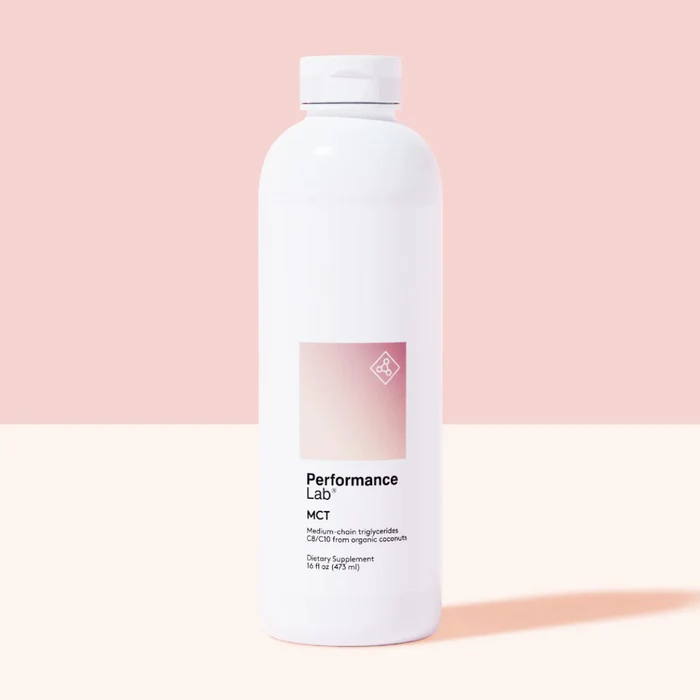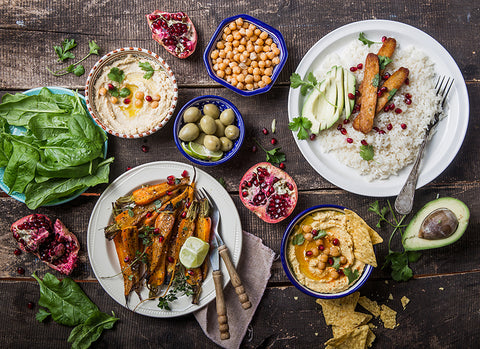Meal replacement shakes are one of the best creations for busy people who sometimes don’t have time to sit down for a full meal or if you’re looking to push your athletic performance and recovery up a notch.
Whether you’re running out the door to work or only have time for a shower after the gym, they’re a great (and usually healthy) way to get your nutrients in without having to spend an hour cooking, eating, and cleaning.
But they’re also great for people looking for a bit of help with their weight loss goals because they’re basically portion control in a shaker.
So, if you’re not familiar with vegan meal replacement shakes, let’s dive in and explore everything you need to know about them.
Key Takeaways
- Vegan meal replacement shakes can be a convenient way to cover protein, key micronutrients, and calories when you’re busy or on the go.
- The best options use complete plant protein sources, minimal added sugar, and clean ingredient lists without unnecessary fillers.
- Fiber, healthy fats, and added vitamins/minerals help keep you fuller for longer and support stable energy and blood sugar.
- Reading labels is crucial—many “health” shakes hide gums, artificial sweeteners, or low-quality oils that don’t align with long-term wellness.
- Upgrading your shake with quality fats like MCTs can improve satiety, mental clarity, and metabolic support on plant-based days.

What Is A Vegan Meal Replacement Shake?
Don’t confuse a meal replacement shake with a protein shake or smoothie. Meal replacement shakes are exactly like they sound—they’re designed for all-in-one nutrition to literally replace the act of physically eating.
Typically, they are lower in calories than what you would be eating in a meal and are designed to increase satiety and reduce appetite, making them a gold-star choice for many weight management programs.

But generally speaking, meal replacement shakes are a combination of protein, carbs, healthy fats, and all the required micronutrients needed to sustain optimal body function.
The European Union Commission Regulation has found that swapping out two of your daily meals for an energy-restricted diet inclusive of meal replacement products (shakes, bars, etc.) is beneficial for weight loss 1.
According to the EU, products must meet the following compositional criteria to be considered a ‘meal replacement’:
- Energy: 200-250 kcal
- Protein: 25-50% of the total energy content of the product
- Fat: ≤ 30% of the total available energy content of the product
- Vitamins and minerals: ≥30% of the nutrient reference values
Swapping out your entire repertoire of whole foods is never recommended. But adding in a vegan meal replacement shake can be a good option when time isn’t on your side you still want to ensure you’re nourishing your body for maximal performance or weight loss while sticking to a plant-based diet.
The Perks Of A Plant-Based Meal Replacement Shake
You can’t deny that sometimes tossing back a shake is a lot more convenient than having to sit down and eat a full meal, right? But aside from convenience, there are a couple of other benefits that vegan meal replacement shakes have to offer.
1. All-in-one Nutrition
Like we said before, products must meet certain criteria to be considered a meal replacement; an appropriate ratio of protein to carbs to fat, plus the addition of greater than 30% DVI of the essential vitamins and minerals.
But the one area that meal replacement shakes come in clutch in is to give you all the nutrients you need in one sitting. With a protein shake, you’re getting a whack of amino acids, but besides that, there isn’t much more—no B vitamins, antioxidants, fiber, iron, or the like.
However, meal replacement shakes are a great option to cover all of your bases, but remember that they should not be a long-term substitution for eating a healthy diet.
2. Portion Control and Appetite Regulation
Portion control can be the most challenging thing when you’re looking to lose weight; it all comes down to calories in versus calories out, and when you’re used to being able to eat what you want, cutting back substantially can be hard!
Meal replacement shakes offer a super convenient, pre-set portion that increases satiety and suppresses appetite because of being high in protein.
As well, you have to factor in the carbs in meal replacement shakes because otherwise, you’re just having a protein shake.
Assuming they contain the appropriate carb source, most meal replacement shakes will be lower on the glycemic scale and are careful as not to spike blood glucose; when blood sugar rapidly spikes, it’s inevitably followed by a crash, which leaves your mood imbalanced, energy unstable, and your cravings going wild.
Blood sugar fluctuations are never a good thing when you’re trying to lose weight, so by supplying a slow-digesting carb, you prevent these spikes and allow for a steady and sustained release of energy, thereby curbing cravings.
And unless you’re planning on doubling up on the serving sizes, you don’t have to worry about going overboard!
Even so, the nutritional value of meal replacement shakes is still lower than the average food-based meal, so even if you needed to boost it a little, you’re likely still in the clear.
3. Boosts Weight Loss
The role of meal replacement shakes in weight-loss boils down to two premises: reduced energy consumption and higher protein.
The reduced energy consumption part is pretty self-explanatory; you’re taking in fewer calories and (hopefully) burning more, which means you will be in a caloric deficit. Fewer calories in than out equates directly to weight loss.

The protein part, however, is a bit different. Research suggests that consuming a diet high in protein can be beneficial towards weight loss for three reasons [2]:
- Increased satiety—protein results in greater satiety than both carbohydrates or fat and may thereby facilitate reduced energy consumption
- Enhances thermogenesis—higher-protein diets are associated with increased dietary-induced thermogenesis, which also influences satiety and increased energy expenditure (although long-term it’s relatively negligible)
- Maintains fat-free mass—a moderately higher protein diet may provide a stimulatory effect on MPS, favoring the retention of lean muscle mass while improving metabolic profile
A study from the University of Ulm sought to investigate the effects of a protein-rich diet versus a conventional protein diet on weight loss, weight maintenance, and body composition in subjects with metabolic syndrome 3.
Subjects were put on a caloric-deficit diet reduced by 500kcal/day and consumed either a high-protein diet (1.34g/kg/day) or a standard protein diet (0.8g/kg/day) for 12 months; protein-enriched meal replacements were used to supplement the high-protein diet.
Results showed that the group following the high-protein diet lost more body weight and more fat mass than the group following conventional protein intake guidelines. It also significantly reduced the prevalence of metabolic syndrome within test subjects.
The Problem with Conventional Meal Replacement Powders
Like many other dietary supplements out there that the FDA doesn’t regulate, meal replacement shakes are notorious for being full of crap, to put it bluntly.
It’s kind of like a mass gainer, whereby manufacturers stick everything possible in them to load up the protein, load up the carbs, and maximize calories.
Is it effective? Yes.
But is it healthy? Definitely not.
To avoid confusion and frustration when trying to find a good vegan meal replacement shake, let’s take a look at what to avoid in a meal replacement shake and what you should look for instead.
Vegan Meal Replacement Shakes: What To Avoid
Not all vegan meal replacement shakes are made equal. Despite being 100% plant-based, some meal replacement powders out there still represent terrible value for money; they offer minimal nutriton while being stuffed full of sugar, sweeteners, and artifical presevratives.
Before we look at what makes great vegan meal replacement shakes, well, great, it's worth looking at what makes for a bad vegan meal replacement shake. Here are the top thnigs to avoid when buying a plant-based meal replacement supplement.
1. Artificial Anything (Colors and Sweeteners)
Artificial sweeteners and flavors are the two most common additives to dietary supplements.
Because a lot of what we have to take inherently tastes terrible (BCAAs are notoriously bad), manufacturers will mask the taste by loading up their products with artificial sweeteners like sucralose, saccharine, aspartame, and acesulfame potassium, and then bulk it up by making into a delicious cookies’n’cream, vanilla soft serve, or banana flavor (of which the flavors are far from natural).
But the problem here is that the body doesn’t know what these compounds are. With artificial sweeteners especially, your body recognizes the sweet taste, but it doesn’t know that there isn’t really any sugar.
To shuttle all that ‘sugar’ that’s just flooded your body into cells, it releases insulin. Insulin floats around your bloodstream, looking for glucose with absolutely none to be found. So now, you have all this insulin floating around and no job to do 4.
Animal studies have consistently proven that artificial sweeteners cause weight gain because of the insulin response elicited after consumption; because blood sugar does not increase with artificial sweeteners, there is hypoglycemia and increased food intake 5.
Further studies show that rats given artificial sweeteners have steadily increased caloric intake, increased body weight, and increased adiposity 6, 7.
So, they indirectly lead to an increased risk of insulin resistance and diabetes 4, but they also alter gut bacteria, which means you’re more susceptible to a whole line of other chronic health conditions.
2. Soy or Soy-Based Ingredients
Along with things like dairy, eggs, corn, and gluten, soy is a common allergen. And while it’s a concentrated source of plant-based protein, it’s something that you should probably avoid whenever possible. There are a couple of reasons why:
- Bioactive compounds: Soy isoflavones are weak estrogens that, depending on the circumstance, can act as agonists, partial agonists, or antagonists to endogenous estrogens and xenoestrogens at estrogen receptors. While they’re not crazy potent and activity varies by tissue, cell type, hormone receptor type, and stage of differentiation, they may interfere with steroid metabolism and alter the ratio of estradiol metabolites 8. For people that struggle with estrogen imbalances, this can be helpful, but for those of us who don’t, it has the potential to cause issues.
- Genetic modification: One of the big dangers with genetically modified food, apart from ethical concerns, is that the crops are modified to become resistant to various pests, which also raises the question of bacterial resistance within the body and the creation of superbugs 9. Beyond this, there are a lot of questions regarding the health concerns of all GMO foods, including soy, so it’s always best to avoid them whenever possible and opt for healthier, less harmful alternatives like brown rice protein.
3. Added Sugar
If you’re trying to manage your weight, sugar is the last thing you want to be consuming. If you’re not burning it off immediately and your glycogen stores are already maxed out, your body is going to convert it directly into fat.
Not to mention that excess sugar causes a blood sugar rollercoaster, which can eventually result in diabetes, insulin resistance, weight gain, among other metabolic conditions.
Finding The Best Vegan Meal Replacement Shakes: 4 Things To Look For In Your Shake
Now that we've covered the things you need to avoid when buying a vegan meal replacmeent shake, let's take a more positive turn. Here are the things which make the best vegan meal replacement shakes the top quality supplements that they are!
Bare these in mind when buying a plant-based meal replacement powder or bar and you wont go far wrong.
1. Balanced Macronutrient Composition
If you look at a label on a mass gainer, you’ll quickly see that they’re loaded with carbs and your serving size is absolutely massive (who really wants to consume that much powder in one serving?!). But in the best vegan meal replacement shake, you want to make sure your macronutrients are balanced.
Suppose you’re trying to maintain weight or gain some muscle, and you’re consuming your shake post-workout.
In that case, you probably want to aim for about a 2:1 ratio of carbs to protein to enable glycogen replenishment and stimulate MPS. This is assuming you're using a high quality, highly bioavailable plant-based protein powder.
We recommend using pea protein powder or brown rice protein powder in your vegan meal replacement shake, as these have the best amino acid profiles and the highest bioavailability (at least on par with whey).
If a vegan meal replacement shake is too heavy on either the carb or protein side, it’s probably not going to help you accomplish what you want.
2. Adequate Plant-Based Protein
Like we said earlier, protein has the highest satiety of the three macronutrients, so if you’re looking to lose weight (or even gain muscle), you want to ensure that your meal replacement shake is going to help you by either keeping you full or providing fuel to power up MPS. Anywhere from 20-30g of protein per serving is generally a good amount.
For those on a vegan diet, protein is a particularly important consideration. Plant-based protein is perfectly adequate for building muscle, but it is harder to come by in large quantities. The best vegan meal replcement shakes will have a high protein content, sourced from high quality plant-based protein powders. Popular options are pea protein or, ideally, organic brown rice protein.
3. Slow-digesting Carbs
Meal replacemement shakes aren't just about protein. The last thing you want from a meal replacement shake is to be hungry an hour or two later; its goal is to keep you satisfied and suppress your appetite until your next meal.
That’s going to be partially reliant on the composition (protein and fat) and the type of carbs it contains.
If your shake is full of quick-digesting, high-glycemic carbs, it’s going to spike your blood sugar, and once it drops, you’re not only going to feel a drop in energy, but your appetite is probably going to kick up. As such, look for lower glycemic carbs that provide a steady energy release to keep you going.
4. Natural Sweeteners and Flavors
As we just discussed, you want to avoid artificial colors, flavors, and sweeteners whenever possible because not only are manufacturers not required to list what ‘natural flavors’ means and what they’re actually made from, but they can cause a lot of health issues, specifically metabolic ones, which is going to counteract your efforts to lose weight completely.
Instead, opt for natural sweeteners like monk fruit and stevia, along with natural flavors derived from real ingredients (cocoa powder, vanilla bean, cinnamon, etc.). They don’t just taste great, they also have health benefits associated with them.
Vegan Protein Powder vs Meal Replacement Shakes: Which is better for muscle maintenance?
For a post-workout nutrition shake, most people instinctively opt for a protein shake. After all, protein is the main driver of muscle growth, right?
Wrong!

While protein is indeed needed for proper muscle tissue growth and maintenance, protein shakes alone are far from optial for putting on mass, including lean muscle mass. Any profesisonal athlete will tell you that carbohydrates are absolutely necessary if you want to pack on serious size.
This is why a good vegan meal replacement shakes is much more effective as a post-workout than a standard vegan protein powder.
The combination of high quality plant-based protein and natural, food-derived carbohydrates you get from the best vegan meal replacements supercharges recovery and promotes growth by spiking insulin. As the growth signal for your body, insulin both triggers mucle mass growth and helps shuttle nutrients to your muscle cells to start recover.
As a general rule, an ideal vegan post-workout recovery shake should combine 20 grams of protein (plant-based protein of course) with some fast acting carbohydrates, although the sugar content should be minimal. Organic brown rice protein has a similar profile of amino acids to whey, making it one of the best protein sources, period.
Final Thoughts: Choosing the best meal replacement shake for your diet
We get it - deciphering the mass amounts of nutritional bars, shakes, powders, pills, and whatever else have you can be overwhelming.
Throw a strict diet like a vegan or plant-based diet into themix, and things get even more complicated.
But if you’ve been struggling to lose weight, gain weight, or simply need something around for those times when full meals aren’t an option, having a vegan meal replacement shake in reach is super convenient.
While meal replacement shakes (or protein shakes for that matter) can never and should never be used to replace a healthy, balanced diet, they are a far better ption than eating low quality, processed junk food.
Getting adequate nutrition can be tough if you're on the road or if you have a busy shedule. Having high quality plant protein, fast-acting carbs and some essential nutrients ready to go in a shake sallows you to avoid either having to eat fast food or go hungry, neither of which is ideal.
Just be mindful that what you put into your body will dictate the results you see, so always opt for the cleanest and most effective option you can find, and add your own unique spin to tailor it to your specific goals. The best vegan meal replacement shakes are always going to give you superior results to cheap, low quality protein powders.
References
- Lex Access to European Union law. EUR. https://eur-lex.europa.eu/eli/reg/2016/1413/oj. Published 2016.
- D Paddon-Jones, E Westman, RD Mattes, RR Wolfe, A Astrup, M Westerterp-Plantenga. Protein, weight management, and satiety. Am J Clin Nutr. 2008;87(5):1558S-1561S.
- M Flechtner-Mors, BO Boehm, R Wittmann, U Thoma, HH Ditschuneit. Enhanced weight loss with protein-enriched meal replacements in subjects with the metabolic syndrome. Diabetes Metab Res Rev. 2010;26(5):393-405.
- K Mathur, RK Agrawal, S Nagpure, D Deshpande. Effect of artificial sweeteners on insulin resistance among type-2 diabetes mellitus patients. J Family Med Prim Care. 2020;9(1):69-71.
- KR Tandel. Sugar substitutes: Health controversy over perceived benefits. J Pharmacol Pharmacother. 2011;2(4):236-243.
- SE Swithers, TL Davidson. A role for sweet taste: calorie predictive relations in energy regulation by rats. Behav Neurosci. 2008;122(1):161-173.
- T Hampton. Sugar substitutes linked to weight gain. JAMA. 2008;299(18):2137-2138.
- JR Barrett. The science of soy: what do we really know? Environ Health Perspect. 2006;114(6):A352-A358.
- AS Bawa, KR Anilakumar. Genetically modified foods: safety, risks and public concerns-a review. J Food Sci Technol. 2013;50(6):1035-1046.












